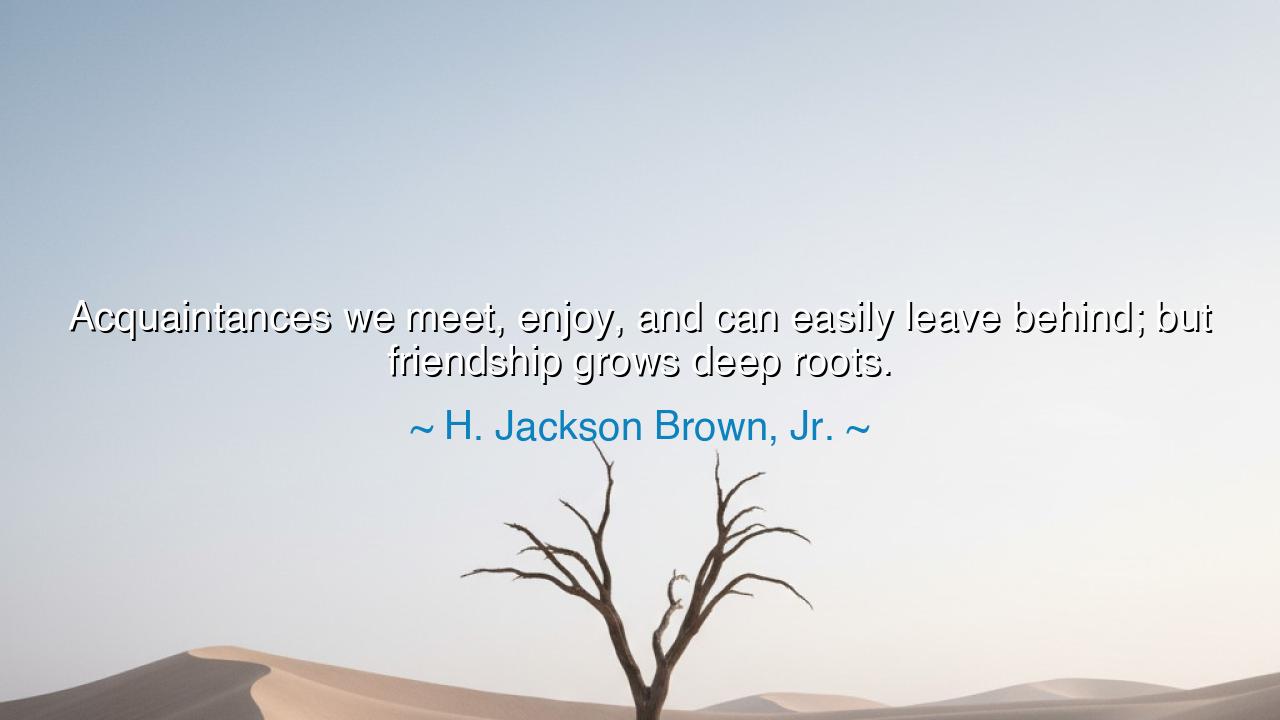
Acquaintances we meet, enjoy, and can easily leave behind; but
Acquaintances we meet, enjoy, and can easily leave behind; but friendship grows deep roots.






“Acquaintances we meet, enjoy, and can easily leave behind; but friendship grows deep roots.” Thus spoke H. Jackson Brown, Jr., the humble chronicler of wisdom whose sayings have illuminated the quiet virtues of daily life. In this reflection, he distinguishes between two forms of human connection: the fleeting touch of acquaintance and the enduring embrace of friendship. Like the difference between a passing breeze and a steadfast tree, one brushes against us lightly and moves on, while the other anchors itself deep within the soil of the soul. Brown reminds us that true friendship is not born in a moment—it is cultivated over time, strengthened by trust, and tested by the winds of adversity.
The origin of this thought lies in Brown’s simple yet profound observations of human nature. His writings often emerged from the quiet spaces between ordinary moments, where the truths of life reveal themselves most clearly. He understood that while life grants us countless encounters, only a few of these blossom into something sacred. Acquaintances come easily, for they require little effort; a smile, a shared conversation, a fleeting connection of circumstance. But friendship, he tells us, is of a different kind. It is the work of patience, loyalty, and love—a bond that sinks deep roots into the heart, so that even when time or distance separates us, the connection remains alive beneath the surface.
In the ancient world, this truth was well understood. The Greeks spoke of philia, the noble friendship that unites hearts not through pleasure or gain, but through mutual respect and virtue. The Roman philosopher Cicero declared that friendship is “the mutual agreement of goodwill and affection,” and that it can only exist between the good. Such friendship, he said, endures all trials, for it is founded on the unchanging soil of character. Brown’s words echo this timeless wisdom: acquaintances bloom and fade with the season, but friendship, when rooted in truth, grows like an oak that no storm can fell.
Consider the story of Helen Keller and Anne Sullivan, one of the greatest friendships history has ever known. When Anne first came into Helen’s life, she was merely a teacher—an acquaintance assigned by fate. Yet through patience and sacrifice, that relationship transformed into a bond of profound friendship. Anne’s love and persistence opened the gates of language and light for Helen, while Helen’s courage and gratitude gave Anne purpose and joy. Their souls became intertwined, their roots growing together in the soil of shared struggle and triumph. Long after Anne’s passing, Helen wrote of her with reverence, saying that no separation could ever undo what they had built together. Such is the nature of true friendship—it lives not on the surface, but in the depths.
Brown’s wisdom also invites us to reflect on the nature of our own connections. In this modern age, where speed and novelty often replace depth and devotion, we collect acquaintances as easily as pebbles. We speak often, yet rarely listen; we meet many, yet truly know few. But friendship cannot be rushed. It is not built on quantity, but on quality—on the slow intertwining of lives, the willingness to share burdens, and the courage to remain steadfast when it would be easier to walk away. Like roots, friendship grows unseen, nurtured by loyalty, trust, and the shared waters of experience.
Yet, we must also recognize that not every seed takes root. Some relationships will remain as acquaintances, pleasant but passing, and that is their nature. The wise man does not mourn their brevity, but cherishes them for what they are. But when he finds friendship—true, deep, and rare—he tends it with care. For friendships are like trees in a field: they provide shelter through life’s storms, strength when the ground shakes, and beauty that endures through every season. To lose such a friend is to lose a part of oneself; to honor such a friend is to honor the divine capacity for love that dwells in every human heart.
Let this, then, be the lesson of H. Jackson Brown, Jr.: seek not the multitude of acquaintances, but the depth of one true friendship. Choose your companions not for convenience, but for character. Be patient in nurturing those who matter, and steadfast when trials arise. Speak truth even when it stings, forgive when it wounds, and rejoice when love returns in kind. For in doing so, you will plant roots that reach beyond time itself—roots that drink from the waters of loyalty, faith, and shared joy.
For when the years pass and faces fade into memory, it will not be the countless acquaintances that you remember, but the few whose friendship grew deep roots within your heart. And in that remembrance, you will know that such love was not fleeting—it was eternal, planted by kindness, watered by trust, and illuminated by the golden light of the soul. For acquaintances may decorate the garden of life, but friendship is its tree—the one that stands firm through all the seasons of man.






AAdministratorAdministrator
Welcome, honored guests. Please leave a comment, we will respond soon